


Framed or unframed, desk size to sofa size, printed by us in Arizona and Alabama since 2007. Explore now.
Shorpy is funded by you. Patreon contributors get an ad-free experience.
Learn more.

- Illuminate us
- I remember it well
- I can't prove it
- Complicated then, forgotten now
- Bryan-Stevenson
- Skinny is as skinny does
- How do you rest in peace
- Riding the footboards
- Alas, hidden from view
- Baldwin Diesels
- Exclusive pump
- Bananas, Oysters and Smokey Joe
- Details, Details
- What's that building to the left of the tower?
- Coal Barges
- Bromo-Seltzer
- Inner harbor
- The Basin
- What a headache!
- Giant stepladder?
- Yeah, it was cold
- Love those coats
- Link & Pin Days Remnant
- Baldwin 62303
- Baldwin VO-1000
- Cold
- No expense spared
- Tough Guys
- What's your hurry, where's your hat?
- Sheriff's Signature
Print Emporium
War Store: 1941
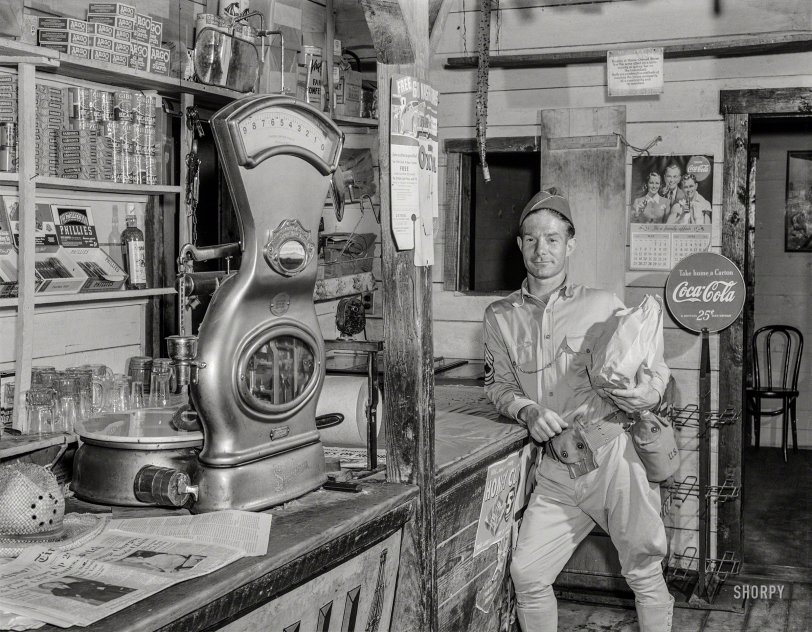
June 1941. "In the area being taken over by the Army -- Caroline County, Virginia. Most of the customers at this store are now soldiers. Many of the people in the area have already moved out and the owners of the store are making plans to move." Medium format acetate negative by Jack Delano. View full size.
Oxydol giveaway
That is quite some giveaway -- two 1942 Nash sedans every day for 30 days, plus cash prizes daily. I'd enter in a heartbeat. No gas to run it, but it would look nice sitting on the front lawn.
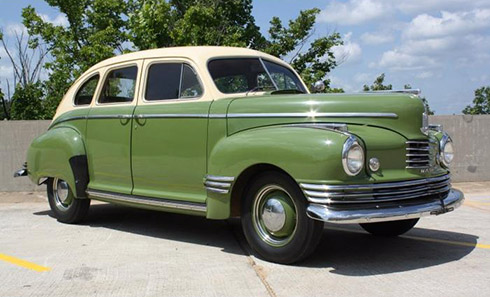
"'Wealthy in Heart'
Anthropologists hired by the Army have recorded interviews with 58 people whose families had to move out so soldiers could move in.
"The government bought 1,116 individual tracts of land, displacing families, farms, schools, churches and communities that had existed in the sleepy countryside for generations," according to the manuscript of a book containing the interviews and photographs.
https://fortaphill.files.wordpress.com/2011/05/wealthyinheart.pdf
"Hundreds of farming families who had lived there for generations were caught up in the whirlwind of history and gracefully acquiesced their lands for the needs of their country," but not without some dissent and heartbreak.
"From the government's perspective, it was a necessity. For those whose land was taken, there was no alternative but to go. For some, it was a blessing in disguise that moved them on to better conditions and opportunities. For others, no worse a catastrophe could have befallen them as they lost their lands, legacies and lifestyles, never to be regained."
These rural Caroline residents' stories remained largely untold until the recent interviews.
Now the interviews have been transcribed for a book that will be available to the public. It will be titled "'Wealthy in Heart': Oral History of Life Before Fort A.P. Hill," said Marie B. Morton, a co-leader of the team of anthropologists.
"We are in the process now of determining how many copies to publish, and what the cost might be," she said.
Morton said she doesn't know how many people were displaced for development of Fort A.P. Hill. "I honestly don't know if anyone has that number because there were so many people living there who were not landowners," she said.
Preservation of this slice of Caroline history has come about largely through the effort of Col. Michael S. Graese, former commander of Fort A.P. Hill, who persuaded the Army to finance the oral history.
Fairfax-based Paciulli, Simmons and Associates Ltd., which has a Fredericksburg branch office, fielded the team that conducted the interviews and gathered the photographs. PSA's services include engineering, planning, surveying, landscape architecture, environmental and wetlands science and cultural resources.
It all began in 2006 when Graese attended the annual Mica High School reunion on the base. He was fascinated by the school graduates' stories of their rural way of life that once existed in that part of Caroline.
With the Army's financial backing, PSA launched the oral-history project in April 2007. Allan Morton, Marie B. Morton, Jerrell Blake Jr., Royce McNeal, Carolyn Hemphill, Beryl Carter and Marion Simmons conducted 82 hours of taped interviews and collected more than 300 photographs.
Those interviews have yielded a wealth of details, memories and points of view of people whose families once lived where Fort A.P. Hill is today.
On the military installation, Mica High School still stands as a symbol of a bygone era.
The high school was erected in 1918 at a cost of about $10,000, and opened with 70 students and four teachers, according to Marshall Wingfield, author of "History of Caroline County Virginia." In the 1920s, Wingfield wrote, more than half of the Mica High School graduates went on to college.
Back in the 1930s, a visit to a rural community's general-merchandise store, such as Smithers' at Delos, often meant chatting with neighbors and catching up on local news, according to those interviewed. For a child, it was a special treat.
Maynard Penney 75, a Bowling Green Realtor, remembers living in Upper Zion, which had a post office, a church and a couple of stores in addition to the homes. His father was a farmer, and Penney was born there. "I was not quite 9 when we moved from there," he said.
For the forthcoming book, Allan Morton, the other Co-leader of the project, wrote a dedication to the people who supplied their "little histories" about their lives before development of Fort A.P. Hill.
"Many people see history in a large big-picture sense," Morton wrote. "To them, it's only significant if the world or the country has undergone change."
But for "an anthropologist--one who studies people and their culture--significance lies not necessarily in the big-picture, but in understanding the everyday lives of people.
"This oral history is especially significant because it focuses on a lost world."
The forthcoming book of interviews and photographs, Morton wrote, "is dedicated to all the people who gave their time to open their hearts and share their memories and thoughts so this history could be told."
Video "Wealthy in Heart: Oral History of Life Before Fort A P Hill"
Management's Plans
I hope they decided to change the flypaper before moving.
Wow!
So much -- including a fully loaded flypaper hanging. Certainly the most misdressed soldier I've seen.
Sign of the times
The sign over the soldier's shoulder is interesting. It reads, "Buying at Home-Owned Stores has the same effect on a community as savings has on the individual. Both are constructive methods of insuring the future prosperity of a community and it's members." Sounds like this store is dealing with Wal-mart and Amazon. Things keep repeating I guess.
Cigars & booze
Also sardines & beans. And a whole lot of flies.
Fly Ribbon
You've gotten your money's worth out of that fly ribbon, and it's good to see that this country did have a good 5-cent cigar.
Note the mirror over the scale. It kept the shopkeeper from weighing his thumb along with the pork chops.





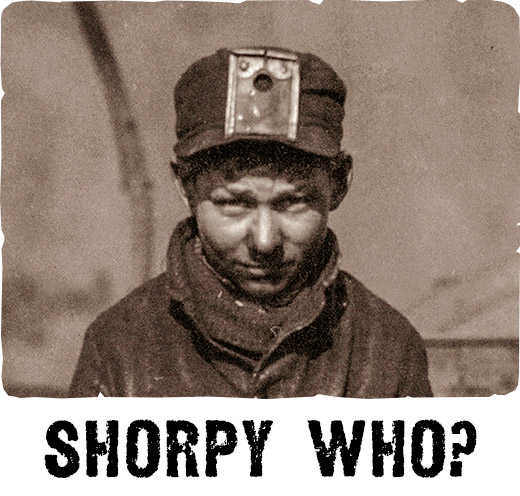
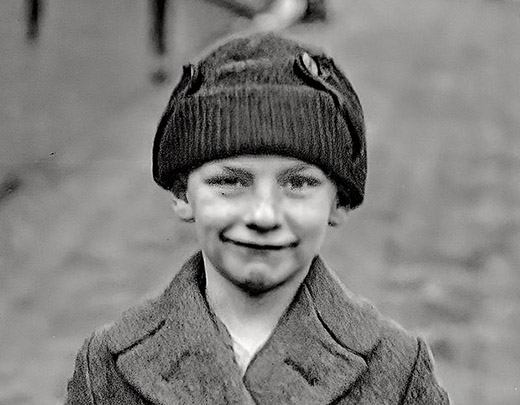
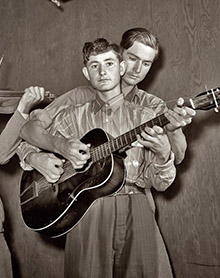
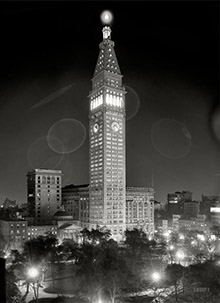
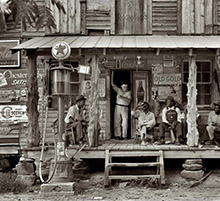
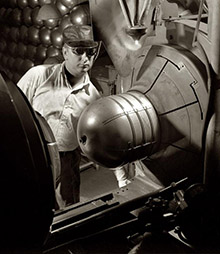
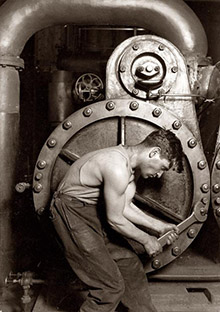

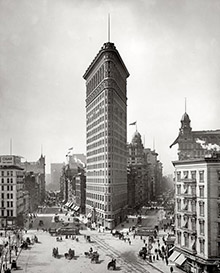



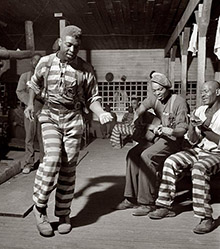

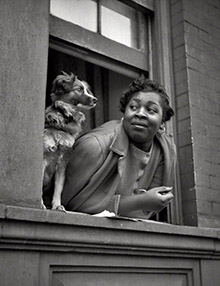

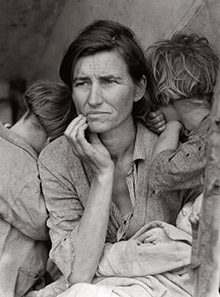

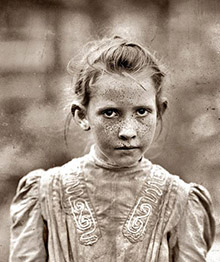
On Shorpy:
Today’s Top 5